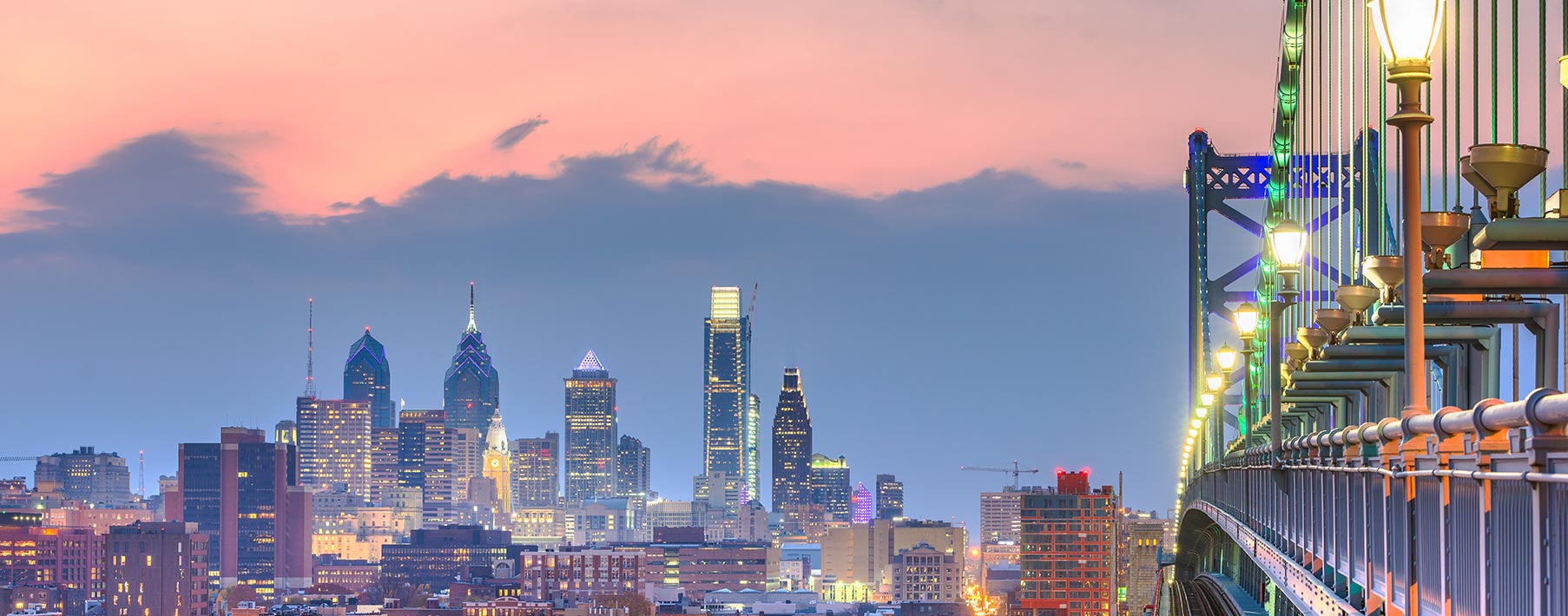
Homeowners Insurance in Philadelphia
Philadelphia is often considered a quintessential American city with a lot to offer. Also known as the City of Brotherly Love and Philly, it has top-notch schools, friendly communities, low cost of living, great food, and exciting street fairs. Plus, it's home to beautiful state parks, scenic trails, wetlands, gardens, and plenty of rivers and creeks to explore.
However, Philly's natural beauty comes with risks. The city experiences floods, thunderstorms, blizzards, power outages, and heavy snowstorms. While no insurance policy could cover every possible disaster, the right homeowners insurance could protect you from financial loss in many common situations.
This article will help explore all you need to know about homeowners insurance in Philadelphia, from what it covers and how much it costs to some actionable workarounds that could help lower the annual premiums.
How much is the average homeowners insurance in Philadelphia?
The cost of home insurance in Pennsylvania depends on where you live. For example, the average homeowners insurance in Philadelphia is $1,910 per year, while homeowners in Pittsburgh could expect to pay around $1,330 annually.
Curious about the state's average cost over the last five years? Check out the table below for a breakdown of Pennsylvania's average home insurance rates over time. Keep in mind that these numbers reflect statewide averages, not specific city rates.
If you're interested in seeing how costs have changed over time, the following table shows Pennsylvania’s average home insurance rates for the past five years. Please note that these numbers reflect statewide averages, not specific rates in individual cities.
Year | Average Annual Premium |
|---|---|
2025 | $1,410 |
2024 | $1,101 |
2023 | $1,128 |
2022 | $1,041 |
2021 | $1,014 |
What factors influence my home insurance rate?
Numerous factors determine the cost of homeowners insurance in Philadelphia. Here are some of the common factors that may impact your rates in Philly.
- Location: If your dwelling is in an area prone to flooding, crime, or natural disasters, it may have higher premiums.
- Home value and age: Older homes, or those with higher rebuilding costs, may require more coverage, which could impact premium amounts.
- Credit score: Insurance companies typically review your credit scores to evaluate risk and pricing.
- Claims history: A history of frequent claims could lead to higher premiums.
- Coverage level: More comprehensive policies with higher limits will naturally cost more.
- Home security measures: Homes with security systems, smoke detectors, and fire-resistant materials may qualify for lower rates.
- Deductible amount: Choosing a higher deductible could reduce your premium, but it will also require you to pay more out-of-pocket should a claim occur.
Common insurance discounts in Philadelphia
The best homeowners insurance discounts in Philadelphia are the ones you qualify for, and they could add up to substantial savings. Luckily, most Philadelphia home insurance companies provide a wide variety of discounts, and many are easy to get.
Here are some common insurance discounts you'll find as a homeowner in Philly:
- Multi-policy (bundling) discount: Bundling your home and auto insurance with the same company could save you up to 25%. Some insurers also offer discounts if you bundle home insurance with life, umbrella, service line, or other types of coverage.
- Early quote discount: When you get home insurance quotes in Philadelphia before your policy starts, chances are it could lower your premium. Let's say you're closing on a home in a few weeks or planning to switch insurance providers. Requesting a quote in advance may help you save.
- Claims-free discount: If you haven't filed a home insurance claim in the past three to five years, you may qualify for a discount. Insurance companies see claim-free homeowners as lower risk, which could lead to lower rates.
- Loyalty discount: Staying with one company for a few years often helps you earn a loyalty discount. However, if your premium increases significantly, it's best to compare quotes from other providers.
- Home improvement discount: If you have recently renovated your home or upgraded key features, you may qualify for savings. Newer construction is considered less risky, which typically makes it cheaper to insure.
- New roof discount: Replacing an old roof could lower your insurance costs in Philadelphia. A new, sturdy roof is less likely to require costly repairs. New home or first-time buyer discount: You may qualify for certain discounts if you purchase a brand-new home. Some insurers extend these savings to homes built within the past few years.
- Senior and retiree discounts: Many insurance providers offer discounts for retirees or homeowners over a certain age. If you're eligible, this could be an easy way to lower your premium.
What does home insurance in Philadelphia cover?
If you own a dwelling in Philadelphia, homeowners insurance could protect you financially if something happens to your property, belongings, or even a guest.
The right homeowners insurance in Philadelphia, PA, could help cover the costs of unexpected events – major disasters or just plain inconveniences.
- Dwelling coverage: This coverage could help pay for damage to your home's structure. If a winter storm causes your pipes to burst and damage your walls or strong winds knock a tree onto your house, your policy could help cover the repairs.
- Other structures coverage: If a covered event damages your driveway, fence, or shed, your home insurance in Philadelphia could help cover the costs.
- Loss of use coverage: If your home becomes unlivable due to a covered disaster, this coverage could help pay for temporary housing, food, laundry, and other daily expenses.
- Personal property coverage: This coverage protects your belongings inside and outside your home. If a burst pipe ruins your couch or someone steals your phone at a coffee shop, your insurance could help replace them.
- Liability coverage: If someone slips on ice in your driveway and gets hurt, you could be held responsible. Liability coverage could help pay for legal and medical costs if you're found at fault for an injury or property damage.
- Medical payments coverage: If a guest gets an injury at your home – or you accidentally hurt someone outside your home – your policy could help cover their medical expenses.
Additional Philadelphia insurance coverage options
Standard home insurance in Philadelphia, PA, helps cover many common risks, such as dwelling and other structures. However, some situations, like theft and certain types of personal property, require additional protection.
Depending on where you live, you may need to add coverage to your home insurance policy or purchase a separate policy. Here are a few key risks to consider:
- Flood insurance: Philadelphia isn't known for frequent flooding, but certain areas – such as Eastwick and South Philadelphia – are more at risk. According to one report, 31% of properties in the city face some level of flood risk. Since flood damage is typically not covered by standard homeowners insurance, separate coverage may be necessary through your insurer or the National Flood Insurance Program (NFIP) if you live in a high-risk area. Also, mortgage lenders may require it.
- Windstorm coverage: Philadelphia often experiences windstorms with gusts exceeding 34 mph, which could cause significant damage to homes. Although the best homeowners insurance in Philadelphia typically includes coverage for wind damage, you should still check your policy details.
- Tornado coverage: While tornadoes are rare in Philadelphia, they do happen. Between 1950 and 2015, the city recorded eight tornadoes. Most homeowners insurance policies in Philadelphia cover tornado damage, but some exclusions may apply. Therefore, always review your policy and speak with your insurer to understand your coverage.
- Umbrella insurance: If a liability claim exceeds your home insurance policy limit, an umbrella policy could provide extra protection for your assets.
- Sump pump & water backup coverage: Standard homeowners insurance doesn't cover sewage back-ups or sump pump overflows. If heavy storms cause water to back up into your home, this optional coverage could help pay for the damage.
What Philadelphia residents need to know
Philadelphia homeowners considering purchasing insurance should be mindful of several important factors regarding coverage, such as:
- Weather-related risks: Philly might not be prone to frequent natural disasters, but storms and hurricanes that occur every once in a while could cause significant damage. It's essential to ensure your policy covers such events.
- Older homes: Philadelphia has many historic homes. Owners should check if their insurance covers the unique features and potential higher repair costs associated with older structures.
- Local regulations: Get yourself acquainted with local building codes and regulations, as they could impact rebuilding costs and insurance requirements.
- Neighborhood crime rates: Living in high-crime areas may increase insurance premiums.
- Policy exclusions: Always read the policy details to understand what is not covered in your policy.
How to lower your Philadelphia home insurance premium
Finding the best homeowners insurance in Philadelphia doesn't mean you have to overpay. While insurance costs are rising, there are ways to lower your premium and still get great coverage.
- Increase your deductible: Choosing a higher deductible means you'll pay more out of pocket if you file a claim. However, it also lowers your monthly premium. Make sure you have savings set aside in case of an emergency.
- Improve home security: When you install smart security systems, alarms, or reinforced doors, it could reduce insurance costs. Many insurance carriers offer discounts for homes that are maintained with professional security systems.
- Bundle your policies: If you have auto or renters insurance, bundling them with your home insurance could save you money. Many companies offer discounts for multiple policies.
- Shop around for the best rate: Insurance premiums vary, so it’s beneficial to compare multiple providers before choosing a policy. Independent agents could help you find cheap home insurance in Philadelphia that still offers strong coverage.
- Maintain a high credit score: A good score could help you secure a lower insurance rate. Pay bills on time, keep credit balances low, and check your credit report for errors to keep your score in good shape.
Looking for homeowners insurance in a different Pennsylvania city?
If you're searching for homeowners insurance outside of Philadelphia, here are some other Pennsylvania cities to consider:
Still have questions?
Curious to learn more about homeowners insurance in Philadelphia? Here are some frequently asked questions:
Did homeowners insurance go up in Philadelphia?
Yes, home insurance premiums in Philadelphia have generally increased over the past few years. Factors contributing to this rise include inflation, increased rebuilding costs, and a higher frequency of claims due to weather-related damages. Make sure to compare quotes annually to ensure you get the best rate.
How much is condo insurance in Philadelphia?
Condo insurance in Philadelphia typically costs around $455 per year, depending on your coverage level. Unlike standard homeowners insurance, condo insurance (HO-6 policy) mainly covers personal belongings, jewelry, interior structures, and liability protection.
Do you need earthquake insurance in Philadelphia?
While Philadelphia has never had a major earthquake, minor tremors could still occur. Your standard home insurance policy won't cover earthquake damage, so if you're concerned about this risk, it is recommended that you consider adding a separate earthquake insurance policy.
Which Philadelphia insurance company offers the most affordable home insurance?
The most affordable homeowners insurance in Philadelphia could vary depending on factors such as your home's location, zip code, size, and security features. Some of the top carriers that provide competitive rates include State Farm, Allstate, Liberty Mutual, Erie Insurance, and Farmers. To find the best deal, it's recommended to get quotes from multiple insurers and inquire about available discounts.



